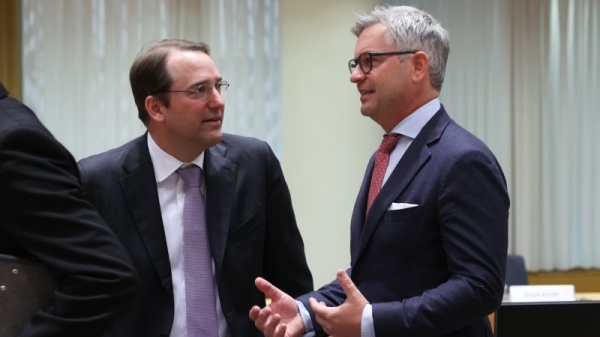Bank crisis rules proposal ‘not acceptable yet’ for Germany, Austria

Meeting on Tuesday (16 May) in Brussels, EU member state finance ministers discussed the Commission’s proposal for an updated Bank Crisis Management and Deposit Insurance (CMDI) framework, revealing divisions between member states.
The European Commission presented the CMDI proposal on 18 April. It proposed including more small and mid-sized banks in the scope of resolution instead of letting them go into regular insolvency when they get into trouble.
To address the issue of public money being used to bail out banks, the Commission also proposed using more of a bank’s own funds and funds from industry-funded deposit guarantee schemes to finance the resolution.
These industry-funded deposit guarantee schemes are regarded as an obstacle to the EU’s Banking Union as only some national banking markets can afford to set up these schemes, thus distorting competition in the European banking market.
Never change a winning system
However, member states with these schemes cherish them and do not intend to weaken them.
“We have done our homework in Austria,” the Austrian Finance Minister Magnus Brunner told journalists on Tuesday before the meeting. He said about the Austrian deposit insurance system, “It works well for us, so it’s questionable why we should centralise and change so much.”
His German counterpart Christian Lindner had a similar position, arguing that the “Commission’s current proposal is not acceptable yet.”
“It has always been clear to us that functioning systems must be kept and protected. In the Commission’s proposal, this is not given anymore,” he said.
Asked about the criticism, the EU Commission’s Executive Vice-Presdent Valdis Dombrovskis assured reporters that the Commission “had been consulting widely when preparing this proposal.”
ECB supports Commission’s proposal
However, he also reminded reporters that the Commission had been asked by member state ministers to come up with a proposal in a context where those same ministers could not agree on a work programme for the Banking Union.
Luis de Guindos Jurado, vice-president of the European Central Bank (ECB), disagreed with the German and Austrian positions at the ministers’ discussion.
“Allowing deposit guarantee schemes to fund resolution with strict safeguards creates, according to our view, a win-win situation,” he said, arguing that it would both protect depositors and ensure that the costs would be borne by the banking industry instead of the taxpayers.
Spanish Finance Minister Nadia Calviño supported this view, arguing that the Commission proposal went “into the right direction to keep improving the European banking resolution framework.”
Polish Minister of Finance Magdalena Rzeczkowska also said that Poland favoured financing the resolution of smaller banks through funds from deposit guarantee systems.
Both CMDI elements are important
Meanwhile, the ECB’s de Guindos Jurado told finance ministers that the Commission proposal would only make sense if both key elements were kept intact. “The two components expanding the scope of resolution and availability of adequate funding have to go together,” he said.
Finally, he also said that “the recent events in the US and Switzerland are a sort of wake-up call, signalling how rapidly trust in a bank can deteriorate,” arguing for progress in the Banking Union, which should support financial stability in Europe.
It remains to be seen whether the wake-up call made enough of an impression on finance ministers to make them abandon their positions in favour of a more stable European banking system.
Read more with EURACTIV




